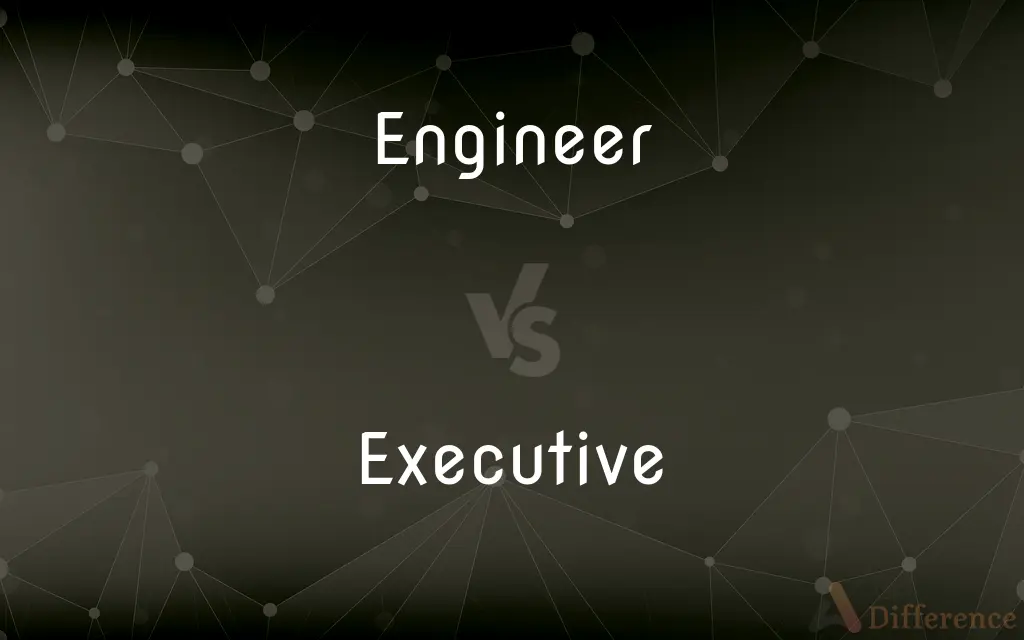Engineer vs. Executive — What's the Difference?
By Urooj Arif & Maham Liaqat — Updated on March 1, 2024
An engineer solves problems using technical and scientific knowledge, focusing on design, development, and analysis, while an executive manages organizations, making strategic decisions and overseeing operations.

Difference Between Engineer and Executive
Table of Contents
ADVERTISEMENT
Key Differences
Engineers are professionals who apply scientific principles, mathematics, and ingenuity to develop solutions for technical problems. They are involved in the design, development, testing, and improvement of products, systems, or structures. Their work is deeply rooted in practical applications of physics and materials science, aiming to innovate and improve efficiency. Executives, on the other hand, are senior-level managers who steer companies or organizations towards their goals. They make strategic decisions, manage resources, and are responsible for the overall direction, including financial planning, policy making, and organizational growth.
Engineers focus on the technical and functional aspects of projects, ensuring that designs meet specified requirements and standards, executives concentrate on the bigger picture, aligning the organization's efforts with its vision and market demands. Engineers might specialize in fields like civil, mechanical, or software engineering, applying specific knowledge to solve problems within their domain. Executives, however, need a broad understanding of business practices, market dynamics, and human resources, often requiring skills in leadership, communication, and strategic planning.
The training for engineers typically involves a rigorous education in their field, including a bachelor’s degree in engineering, and possibly advanced degrees for specialized roles. Engineering roles demand a deep understanding of technical concepts, analytical skills, and continuous learning to keep up with technological advancements. Executive positions, while also benefiting from a strong educational background, particularly in business administration, rely more on experience in management roles, leadership qualities, and the ability to make strategic decisions under uncertainty.
Engineers may progress to senior technical roles, lead engineering teams, or specialize in research and development. Some engineers transition into management, where their understanding of technical processes can inform strategic decisions. Executives, however, climb the corporate ladder through managerial roles, evolving their expertise in navigating complex organizational challenges, stakeholder management, and strategic leadership.
Despite their distinct roles, both engineers and executives are crucial to the success of modern enterprises. Engineers drive innovation and technical excellence, while executives ensure that these innovations are effectively integrated into the organization’s strategic goals, ultimately leading to sustainable growth and competitiveness.
ADVERTISEMENT
Comparison Chart
Role
Solves technical problems using scientific principles.
Manages and leads an organization or specific departments.
Focus
Design, development, and improvement of systems or products.
Strategic decision-making, resource management, and organizational growth.
Skills
Technical expertise, analytical skills, innovation.
Leadership, strategic planning, decision-making.
Education
Typically a bachelor’s degree in engineering, possibly advanced degrees.
Often a degree in business administration, management, or related fields, coupled with experience.
Career Path
Progresses from junior engineer to senior roles, may move into management.
Climbs through managerial roles to executive positions, focusing on leadership and strategy.
Compare with Definitions
Engineer
Specializes in creating and improving products or systems.
A software engineer developed an app that simplifies online transactions.
Executive
Oversees operations, financial performance, and organizational growth.
The executive approved a budget increase for research and development.
Engineer
Engages in continuous learning to keep up with technological advancements.
The aerospace engineer attended a seminar on the latest rocket propulsion technologies.
Executive
A senior-level manager responsible for strategic decisions in an organization.
The CEO launched a new initiative to expand the company’s market share.
Engineer
Focuses on innovation, efficiency, and functionality in designs.
An environmental engineer created a sustainable water filtration system.
Executive
Develops policies and strategies to achieve the organization's goals.
The CFO devised a financial strategy to reduce debt and increase investment.
Engineer
A professional who applies scientific knowledge to solve practical problems.
The civil engineer designed a new bridge that can withstand earthquakes.
Executive
Manages resources and aligns team efforts with the company’s vision.
The COO restructured the manufacturing process to improve efficiency.
Engineer
Works within specific fields such as mechanical, electrical, or chemical engineering.
The mechanical engineer optimized the machine to reduce energy consumption.
Executive
Requires leadership qualities and the ability to navigate complex challenges.
The executive director led the company through a difficult merger, ensuring stability.
Engineer
Engineers, as practitioners of engineering, are professionals who invent, design, analyze, build and test machines, complex systems, structures, gadgets and materials to fulfill functional objectives and requirements while considering the limitations imposed by practicality, regulation, safety and cost. The word engineer (Latin ingeniator) is derived from the Latin words ingeniare ("to create, generate, contrive, devise") and ingenium ("cleverness").
Executive
A person or group having administrative or managerial authority in an organization.
Engineer
One who is trained or professionally engaged in a branch of engineering.
Executive
The chief officer of a government, state, or political division.
Engineer
To plan, construct, or manage as an engineer.
Executive
The branch of government charged with putting into effect a country's laws and the administering of its functions.
Engineer
To plan, manage, and bring about by skillful acts or contrivance
Engineer a business takeover.
Engineer social changes by legislation.
Executive
Of or relating to the branch of government charged with the execution and administration of the nation's laws.
Engineer
A person professionally engaged in the technical design and construction of large-scale private and public works such as bridges, buildings, harbours, railways, roads, etc.; a civil engineer.
Executive
Of, pertaining to, or having responsibility for the day-to-day running of an organisation, business, country, etc.
Executive act
An executive officer
Executive government
Engineer
Originally, a person engaged in designing, constructing, or maintaining engines or machinery; now (more generally), a person qualified or professionally engaged in any branch of engineering, or studying to do so.
Executive
A chief officer or administrator, especially one who can make significant decisions on their own authority.
Engineer
One who manages as engine, particularly a steam engine; an engine driver.
Executive
Designed or fitted for execution, or carrying into effect; as, executive talent; qualifying for, concerned with, or pertaining to, the execution of the laws or the conduct of affairs; as, executive power or authority; executive duties, officer, department, etc.
Engineer
A person who uses scientific knowledge to solve practical problems
Executive
A person who has administrative authority over an organization or division of an organization; a manager, supervisor or administrator at a high level within an organization; as, all executives of the company were given stock options
Engineer
Design as an engineer;
He engineered the water supply project
Executive
A person responsible for the administration of a business
Common Curiosities
What skills are essential for an executive?
Leadership, strategic planning, decision-making, financial acumen, and the ability to manage complex organizational dynamics.
How do the roles of engineers and executives differ in a company?
Engineers focus on technical challenges and innovation, while executives manage the organization’s strategy, operations, and resources.
How do executives contribute to an organization?
Executives make strategic decisions, manage resources, and set the direction to achieve the organization’s goals, ensuring sustainable growth.
Can engineers become executives?
Yes, engineers can become executives, especially if they gain management experience and develop strategic leadership skills.
What educational background is typical for engineers?
Engineers usually have a bachelor’s degree in an engineering discipline, with some pursuing advanced degrees for specialized knowledge.
How does the work of engineers impact an organization?
Engineers drive innovation, efficiency, and technical excellence, which are critical for the development of competitive products and services.
What challenges do executives face?
Executives face challenges such as navigating market competition, managing internal dynamics, and aligning organizational efforts with strategic goals.
Why is strategic decision-making important for executives?
Strategic decision-making guides the organization towards its goals, navigates market changes, and leverages opportunities for growth.
What kind of problems do engineers solve?
Engineers solve practical problems related to design, development, and optimization of products, systems, or structures.
What makes a successful executive?
Success as an executive comes from effective leadership, strategic foresight, and the ability to inspire and align teams towards common goals.
What distinguishes an engineer’s approach to problem-solving from an executive’s?
Engineers use technical and scientific knowledge for problem-solving, focusing on practical applications, while executives address organizational challenges with strategic and managerial approaches.
Do engineers need to understand business principles?
While not always required, understanding business principles can help engineers in roles where technology intersects with market and organizational goals.
What career paths are available for engineers?
Engineers can advance in technical specializations, lead engineering teams, or transition into management and executive roles.
Can the role of an executive vary across different industries?
Yes, the specific responsibilities and challenges of an executive can vary widely across industries, though the core principles of leadership and strategy remain consistent.
How important is teamwork for engineers and executives?
Teamwork is crucial for both roles; engineers collaborate on projects, while executives need cohesive teams to implement strategies effectively.
Share Your Discovery

Previous Comparison
Bother vs. Mind
Next Comparison
Peacock vs. PheasantAuthor Spotlight
Written by
Urooj ArifUrooj is a skilled content writer at Ask Difference, known for her exceptional ability to simplify complex topics into engaging and informative content. With a passion for research and a flair for clear, concise writing, she consistently delivers articles that resonate with our diverse audience.
Co-written by
Maham Liaqat













































